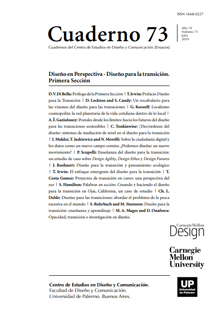Preface
Resumo
É necessária uma mudança em todos os níveis de nossa sociedade para enfrentar os problemas do século XXI. A mudança climática, a perda de biodiversidade, a migração forçada, o esgotamento dos recursos naturais e o crescente fosso entre ricos e pobres são só alguns problemas perversos que requerem novos enfoques para a resolução de problemas. O design de transição ou design para a transição reúne dois conceitos poderosos: a) a ideia de que todas as sociedades necessitarão uma transição até um futuro sustentável, e b) a compreensão de que isto implicará uma mudança ao nível do sistema informado por um profundo conhecimento da anatomia e dinâmica dos sistemas complexos.
Este campo emergente de estudos de transição abarca agora uma comunidade de pesquisadores internacionais das áreas de ciências sociais e administrativas, engenharia, ativismo e disciplinas relacionadas. Entretanto, as contribuições do campo do design e suas subdisciplinas relacionadas são ainda relativamente excepcionais, e o design de transição procura abordar este fosso. Isto é surpreendente pelo grau em que o design impregna os sistemas sócio técnicos e está presente na maioria dos problemas perversos mencionados. Esta ubiquidade, junto com a evolução do design nas últimas décadas para se converter numa disciplina altamente integradora, posiciona ao design e aos designers como pontos de alavancagem potencialmente potentes para uma mudança positiva no nível dos sistemas.
Referências
Boenhert, J. (2008). Design and transition: What designers can learn from the transition movement. Paper presented at the Changing the Change: Designs, Visions, Proposals and Tools Conference, Torino, Italy.
Ceschin, F. (2012). The introduction and scaling up of sustainable Product-Service Systems: A new role for strategic design for sustainability (Doctoral dissertation). Retrieved from https://www.politesi.polimi.it/handle/10589/56785
Design Transition: Ecological Literacy in Design Education. (n.d.) Ecological Literacy in Design Education by 2012. Retrieved from http://teach-in.ning.com/
Gaziulusoy, A. I. (2010). System innovation for sustainability: A scenario method and a workshop process for product development teams (Doctoral dissertation). Retrieved from http://aut.researchgateway.ac.nz/handle/10292/3699?show=full
Gaziulusoy, A. I. (2018). Postcards from “the edge”: Towards futures of designing for sustainability transitions. Cuadernos Journal. Publication in preparation.
Hopkins, R. (2006, 28 April). Willits comes to Kinsale! [Web log post]. Retrieved from https://www.transitionculture.org/2006/04/28/willits-comes-to-kinsale/
Irwin, T. (2011). Wicked problems and the relationship triad. In S. Harding (Ed.), Grow small, think beautiful: Ideas for a sustainable world from Schumacher College (pp. 232- 259). Edinburgh: Floris.
Irwin, T., Tonkinwise, C., & Kossoff, G. (2015). Transition design: An educational framework for advancing the study and design of sustainable transitions. Paper presented at the Sustainability Transitions Research Network Conference, Brighton, United Kingdom.
Irwin, T. (2015). Transition design: A proposal for a new area of design practice, study and research. Design and Culture Journal, 7(2), 229–246. DOI:10.1080/17547075.2015.1051829
Joore, P. (2010). New to improve: The mutual Influence between new products and societal change processes (Doctoral dissertation). Retrieved from https://www.researchgate.net/publication/308781532_New_to_Improve_-_The_Mutual_Influence_between_New_ Products_and_Societal_Change_Processes
Kossoff, G. (2008). The reconstitution of the domains of everyday life: A tool for assessing the health of existing conditions and a framework for designing sustainable solutions based on principles from the natural world. Paper presented at the Changing the Change: Designs, Visions, Proposals and Tools Conference, Torino, Italy.
Kossoff, G. (2011a). Holism and the reconstitution of everyday life: A framework for transition to a sustainable society. In S. Harding (Ed.), Grow small, think beautiful: Ideas for a sustainable world from Schumacher College (pp. 122-142). Floris: Edinburgh.
Kossoff, G. (2011b). Holism and the reconstitution of everyday life: A framework for transition to a sustainable society (Doctoral dissertation). Retrieved from http://ethos.bl.uk/OrderDetails.do?uin=uk.bl.ethos.699805
Kossoff, G., Irwin, T., & Tonkinwise, C. (2015). Transition design: The importance of lifestyles and everyday life as a leverage point for sustainability transitions. Paper presented at the Sustainability Transitions Research Network Conference, Brighton, United Kingdom.
Kossoff, G., Irwin, T., & Willis, A. (Eds.) (2015). Transition design [special issue]. Design Philosophy Papers, 13(1). http://dx.doi.org/10.1080/17547075.2015.1051829
Kossoff, G. (Ed). (2018). Transition design: Widening the conversation. Proceedings of the 2016 Dartington Transition Design Symposium. Dartington: United Kingdom (forthcoming).
Southern Star Staff. (2006, January 17). Kinsale Council Supports Transition Town Venture. The Southern Star. Retrieved from http://www.resilience.org/stories/2006-01-17/kinsalecouncil-supports-transition-town-venture/
Rooney, L. (2006). Kinsale transition town: Projects for 2006. Retrieved from https://www.transitionculture.org/wp-content/uploads/PresentationtoTC6thFeb.doc
Los autores/as que publiquen en esta revista ceden los derechos de autor y de publicación a "Cuadernos del Centro de Estudios de Diseño y Comunicación", Aceptando el registro de su trabajo bajo una licencia de atribución de Creative Commons, que permite a terceros utilizar lo publicado siempre que de el crédito pertinente a los autores y a esta revista.


